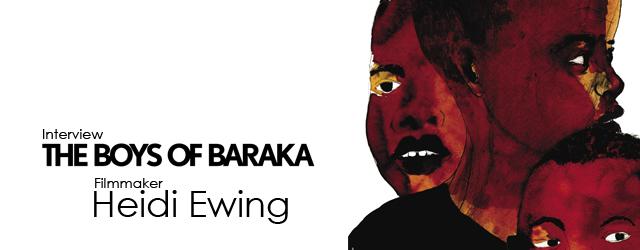School is out for summer. Boys of Baraka’s director Heidi Ewing discovered boys will be boys, even with their entire future at stake. The revealing documentary works as a microcosm that includes all those boys of the projects for whom thug-life is just not that appealing. Directors Heidi Ewing and Rachel Grady’s focused film has received rave reviews and barely any criticism. Their portrait of the year-long field trip that took a group of boys from Baltimore to Kenya is revelatory, as it breaks with several stereotypes and yet, makes the subjects more relatable.
I chatted with Heidi Ewing, on the wake of the premiere of her second documentary with Grady, Jesus Camp, at Tribeca Film Festival, about kids attending summer school hoping to become the next Billy Graham.
Heidi Ewing
Jorge Ignacio Castillo: How did you find out about the Baraka project?
Heidi Ewing: I read about the school in Newsweek. It seemed such a strong experimental idea. I found it immediately intriguing, such a rich story about the American educational system, particularly in Baltimore.
JIC: There is a moment in the movie that works as a twist and a big gloom, when the second year of the kids in Baraka gets cancelled. How did you react and when did you realize this was an opportunity more than a problem?
HE: It was a shock. Without a second year, the story changed dramatically. Eventually, we realized the situation pointed out a more dramatic, intrinsic problem of the public school system, all these programs without follow-up, trounced again.
JIC: What was the reaction of the families when they saw the finished movie?
HE: We did a private screening with the families. During the entire process we had a relationship based on trust with them. They didn’t have to love the film, but they were pleased by it.
JIC: How did you manage the distance you had to maintain as a filmmaker and the feelings you may have for the kids?
HE: Everybody keeps talking about distance, but whenever you introduce a camera to the equation, it will alter things ever so slightly, it’s inevitable. It’s hard to know if our presence changed the outcome, but I never forgot my role. I have no problem with becoming emotionally involved. The key is not to be dogmatic, you are a human being.
JIC: How many times did you go to Kenya?
HE: Each one of us went twice, and every time we found the kids radically different, physically and mentally.
JIC: How are the kids?
HE: Richard (a feisty boy with learning disabilities) dropped out, as predicted, but he is currently in a job program to become a correctional officer. He is doing great, overcoming his problem and pursuing a skill oriented job. Montrey (a former troublemaker who discover his natural math skills while in Baraka) has changed high schools a couple of times. He is very much still a headstrong teenager, we get worried when he gooses off, because he is not allowed to. Devon is doing fantastic in his quest to become a minister. He is doing a documentary himself on the matter.
JIC: Tell me about Bill Cosby’s participation in the DVD.
HE: Our distributor sent him a copy. He considered the movie relevant and it personally touched him. He really wanted to be involved. Considering he is very provocative within the African American community, we weren’t sure what to make of this. During the interview, we realized he really cares about his community and he had a lot to say about the African-American male experience. It was very enlightening.
JIC: Are you happy with the distribution The Boys of Baraka received?
HE: It took us six months to get distribution, but we ended up in sixty cities, all the major markets, so we have high hopes for the DVD. The movie will also be shown in PBS in September.
THINKFilm's The Boys of Baraka was released June 6th on DVD.
